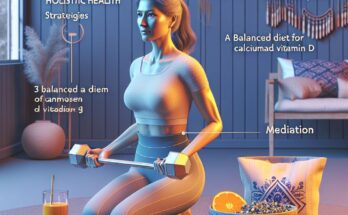Discover how nutritional supplements and holistic practices can support your health and your appearanceduring and after menopause. From addressing hormonal changes to maintaining bone and heart health, we explore the essential nutrients and personalized approaches to navigating this transformative stage with vitality. Learn about the importance of quality supplements, timing, and pairing with a balanced diet, alongside incorporating mindfulness and gentle exercise for holistic well-being.
Key Takeaways
- Supplement Benefits: Nutritional supplements can help address nutrient deficiencies and support overall health during menopause.
- Hormonal Changes: Menopause leads to a decline in estrogen levels, affecting various bodily functions and potentially causing symptoms like hot flashes and mood swings.
- Key Nutrients: Calcium, vitamin D, omega-3 fatty acids, magnesium, and probiotics are essential for menopausal women to maintain bone health, support heart function, and manage symptoms.
- Personalized Approach: Individual needs vary, so it’s crucial to assess dietary intake and consider factors like lifestyle and health conditions when choosing supplements.
- Quality Matters: Opt for high-quality supplements from reputable brands, and prioritize consistency in timing and dosage for maximum effectiveness.
- Supplements and Diet: Supplements should complement a balanced diet rich in whole foods, with timing and pairing enhancing absorption and efficacy.
- Holistic Practices: Incorporating mindfulness, meditation, and gentle exercise alongside supplements promotes overall well-being and supports menopausal health.
Empower Your Post-Menopausal Journey With Supplements
Menopause marks a time of transformation, and with it comes a unique set of health considerations. To navigate this phase with confidence and vitality, it’s essential to understand how nutritional supplements can support your body’s changing needs. It’s not just about taking supplements; it’s about embracing a holistic approach to your health that resonates with your personal journey.
Revitalize Your Body’s Natural Balance
During menopause, the body experiences a decline in estrogen levels, leading to various changes that can affect your physical and emotional well-being. Nutritional supplements, when combined with a balanced diet and healthy lifestyle, can help replenish what your body is losing and restore its natural balance.
Enhance Your Inner Glow
Beyond the physical aspects, menopause is a time to celebrate your inner beauty. Nutritional supplements can help you feel your best from the inside out, enhancing your natural glow and empowering you to embrace this new chapter with grace and strength.
Understanding Menopause and Your Body
Let’s talk about what happens to your body during menopause. As your estrogen levels drop, you might notice changes like hot flashes, mood swings, and disrupted sleep. But it’s not just these visible signs; there are also changes happening on the inside that we need to address with care and knowledge.
Hormonal Changes and Their Effects
Estrogen is like a conductor in an orchestra, directing various functions in your body. When its levels fall, it’s as if the music gets a little off-key. Your bones might become less dense, and your heart might need extra support to stay healthy. That’s why we look to specific supplements to keep the music playing beautifully.
Vital Nutrients Lost During Menopause
As estrogen waves goodbye, it takes along some key nutrients that you need to keep an eye on. Calcium and vitamin D levels can dip, affecting your bone strength. Your heart might miss out on the protective effects of estrogen, making omega-3s more important than ever. It’s all about filling those nutritional gaps to keep you feeling fabulous.
The Top Supplements for Post-Menopausal Health
Now, let’s dive into the supplements that will be your allies during this time. Remember, it’s not about chasing every supplement on the shelf; it’s about choosing what resonates with your body’s needs. Let’s explore these essentials one by one.
Calcium: Strengthen Your Bones
Calcium is the building block of your bones, and when menopause comes knocking, your bones might need a little extra. Think of calcium supplements as reinforcements arriving just when your bones call for backup. But it’s not just any calcium; it’s about finding the right type and pairing it with vitamin D for maximum absorption.
Most importantly, because your body’s ability to absorb calcium changes, you want to ensure you’re getting enough but not too much. The sweet spot? Aim for a total of 1,200 mg of calcium per day, including your diet and supplements. Foods rich in calcium like dairy, leafy greens, and almonds are great, but if you’re falling short, a supplement can bridge that gap.
Vitamin D: Harness the Power of the Sun
Vitamin D is like sunshine in a bottle. It helps your body absorb calcium, and it’s essential for bone health. But there’s more; vitamin D also plays a role in muscle function and immune health. The challenge? As we age, our skin doesn’t synthesize vitamin D from sunlight as efficiently, and we need to look for other sources.
Therefore, getting enough vitamin D can be as simple as spending 15 minutes in the sun daily, but for many, a supplement is necessary to reach the recommended 800 to 1,000 IU per day. It’s like giving your body a sunny boost, even on cloudy days.
Omega-3 Fatty Acids: Support Heart and Brain Health
Omega-3 fatty acids are like your heart’s best friends. They’re known for supporting cardiovascular health, which is especially important as the protective effects of estrogen diminish during menopause. But that’s not all; omega-3s are also champions for your brain, helping to maintain cognitive function as you age.
So, how do you ensure you’re getting enough? Fatty fish like salmon and mackerel are excellent sources, but if fish isn’t your thing, consider a high-quality fish oil supplement. Aim for a supplement containing at least 500 mg of EPA and DHA, the two key omega-3s, to keep your heart drumming and your mind sharp.
Magnesium: Muscle and Nerve Function
Magnesium is the unsung hero of the mineral world. It’s involved in over 300 biochemical reactions in your body, including muscle and nerve function. During menopause, magnesium can be particularly helpful for managing symptoms like sleep disturbances and mood swings.
To get the most out of magnesium, include foods like nuts, seeds, and leafy greens in your diet. If you’re considering a supplement, a common recommendation is around 300 to 400 mg per day. It’s like a soothing lullaby for your nerves and muscles, keeping them relaxed and functioning optimally.
Probiotics: Digestive and Immune Support
Probiotics are your gut’s best pals. They help maintain a healthy balance of bacteria in your digestive system, which is crucial because a happy gut means a happy you. And it’s not just about digestion; probiotics also support your immune system, which is something we all need a little help with as we age.
Incorporating fermented foods like yogurt, kefir, and sauerkraut into your diet is a great start. But if you’re looking for an extra boost, a probiotic supplement can be beneficial. Look for one with a variety of strains and at least 1 billion CFUs (colony-forming units) to keep your digestive tract humming along.
Personalizing Your Supplement Intake
When it comes to supplements, one size does not fit all. Your body, your lifestyle, and your health concerns are unique to you. That’s why it’s important to assess your individual needs before adding supplements to your routine. Consider factors like your diet, any pre-existing health conditions, and your activity level.
Assessing Your Unique Needs
Start by taking stock of your diet. Are you getting enough fruits, vegetables, and whole grains? What about lean protein and healthy fats? Once you have a clear picture, you can identify which nutrients you might be lacking. This is where supplements come in, filling the gaps to help you achieve nutritional harmony.
Quality Over Quantity: Choosing the Right Brands
With so many options on the market, it’s important to choose supplements that are high-quality and from reputable brands. Look for products that have been third-party tested for purity and potency. It’s better to invest in a few high-quality supplements that your body can effectively use than to stock up on a multitude that offers little benefit.
Incorporating Supplements Into Your Daily Routine
Consistency is key when it comes to supplements. Taking them at the same time each day helps establish a routine, making it easier to remember and allowing your body to absorb them more effectively. Think of it as setting a daily appointment for your health.
Example: If you’re taking a calcium supplement, try to take it with your breakfast each morning. This not only helps with absorption but also starts your day with a commitment to your bone health.
But don’t just stop at supplements. Pairing them with a healthy diet rich in whole foods enhances their effectiveness. It’s like creating a symphony of nutrients that work in harmony to support your overall well-being.
Creating Consistency With Timing and Dosage
Find a time that works best for you and stick with it. Whether it’s with your morning coffee or right before bed, creating a consistent schedule will help you reap the maximum benefits from your supplements. And when it comes to dosage, always follow the recommended amount unless advised otherwise by your healthcare provider.
Mixing and Matching: Combining Supplements With Diet
Think of your diet and supplements as a team working together. While supplements can fill nutritional gaps, they work best alongside a diet rich in whole foods. Combine your omega-3 supplement with a salad full of leafy greens, or take your probiotic with a fiber-rich meal to enhance gut health.
Additional Holistic Practices for Optimal Health
Supplements are just one piece of the puzzle. To truly thrive during and after menopause, incorporate holistic practices into your routine. Mindfulness, meditation, and gentle exercise can all play a role in supporting your mental and physical health.
Mindfulness and meditation can help manage stress and improve emotional well-being. Just a few minutes a day can make a significant difference in how you feel. Gentle exercises like yoga or walking can keep your body strong and flexible, helping you navigate the changes that come with menopause.
Mindfulness and Meditation
Embracing mindfulness and meditation can be transformative, especially during the post-menopausal phase of life. These practices help you focus on the present moment, reducing stress and promoting a sense of peace. Even dedicating just five minutes a day to deep breathing or guided meditation can have profound effects on your emotional well-being.
Remember, mindfulness isn’t just about sitting still; it’s about being present in whatever you’re doing, whether that’s enjoying a meal, taking a walk, or simply breathing. It’s about noticing the beauty in the now and finding calm amidst the chaos.
Gentle Exercise for Lasting Vitality
Regular physical activity is a cornerstone of good health, and gentle exercise can be particularly beneficial for women in their post-menopausal years. It’s not about intensity; it’s about consistency and enjoyment. Activities like swimming, walking, or yoga can help maintain muscle mass, support bone density, and boost your mood.
Exercise also helps manage menopause symptoms like hot flashes and sleep disturbances. By incorporating movement into your daily routine, you’re not just caring for your body; you’re also nurturing your spirit and empowering yourself to feel strong and capable.
FAQ
What Time of Day Should I Take My Supplements?
The best time to take supplements varies depending on the type and your personal routine. For example, fat-soluble vitamins like vitamin D are best taken with a meal that contains fat for optimal absorption. On the other hand, some supplements, like magnesium, may be best taken in the evening as they can promote relaxation and help with sleep.
- Calcium: In the morning with breakfast
- Vitamin D: With a meal containing fats
- Omega-3s: With a meal to help with digestion
- Magnesium: In the evening to aid with sleep
- Probiotics: On an empty stomach or with a meal, depending on the brand’s instructions
Ultimately, the key is to integrate supplement intake into your daily routine in a way that ensures you’ll remember to take them consistently.
How Long Does It Take to Feel the Effects of Supplements?
It can take several weeks or even months to notice the effects of some supplements. For instance, it may take up to three months to see changes in bone density from calcium and vitamin D supplementation. Other supplements, like magnesium, may have a more immediate impact on relaxation and sleep quality.
Patience is important when starting a new supplement regimen. It’s also crucial to track your symptoms and any improvements over time, so you can discuss these changes with your healthcare provider.
Can Supplements Interact With Prescribed Medications?
Yes, supplements can interact with medications, sometimes in ways that can affect how your medication works or increase the risk of adverse effects. For example, calcium can interfere with the absorption of certain antibiotics, and omega-3 supplements can affect blood clotting.
Therefore, always consult with your healthcare provider before starting any new supplements, especially if you are taking prescribed medications.
Are There Any Dietary Changes to Complement Supplement Intake?
A balanced diet rich in whole foods is the best complement to your supplement routine. Focus on including a variety of fruits, vegetables, whole grains, lean proteins, and healthy fats in your meals. This not only provides a broad spectrum of nutrients but also enhances the absorption and effectiveness of your supplements.
Additionally, staying hydrated and limiting the intake of processed foods, caffeine, and alcohol can support your body’s overall health and the efficacy of the supplements you are taking.
Should I Consult a Doctor Before Beginning a Supplement Routine?
Yes, it’s always wise to consult with a healthcare provider before starting any new supplement regimen. They can help you understand your individual needs, recommend appropriate dosages, and monitor your progress. Your doctor can also advise you on any potential interactions with medications you’re taking and ensure that your supplement choices are safe and beneficial for your overall health.
By taking a proactive approach to your post-menopausal health, you can feel empowered and confident. Nutritional supplements, when used wisely and in conjunction with a healthy lifestyle, can be a valuable tool in your wellness arsenal. Remember, you’re not just surviving this phase of life; you’re thriving in it.



